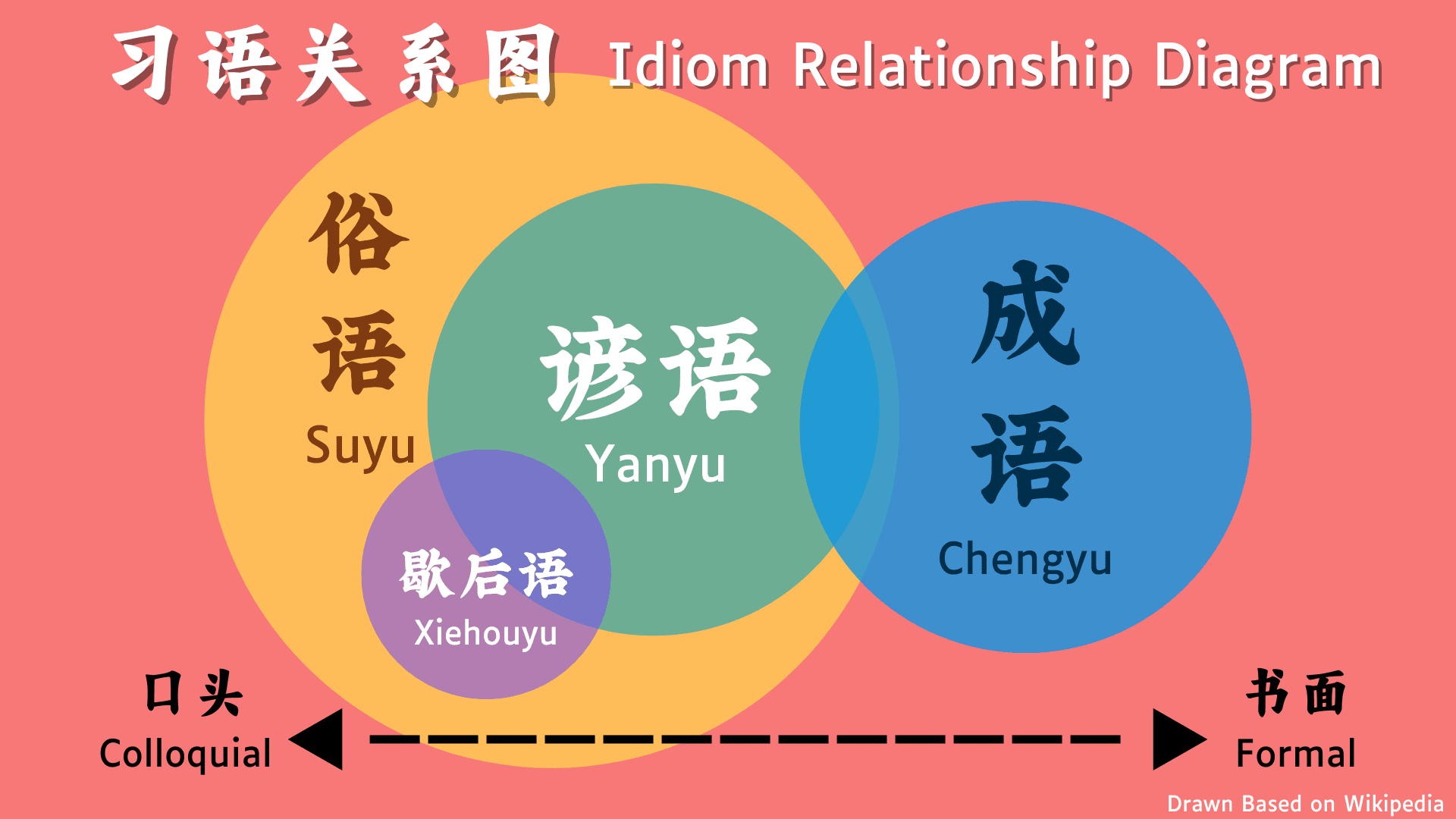The Chinese language is renowned for its rich collection of idiomatic expressions, each carrying centuries of wisdom, cultural insights, and practical knowledge. These expressions aren't just linguistic tools—they're windows into Chinese thinking, values, and ways of life.
What Are Chinese Idiomatic Expressions?
Chinese idiomatic expressions (习语, xíyǔ, or 熟语, shúyǔ) encompass several distinct types of sayings, each with its own characteristics and uses. Think of them as different flavors that make up the rich taste of the Chinese language.

1. 成语 (chéngyǔ) – Chengyu, Four-character literary idioms
These are standardized expressions often with four characters derived from classical literature, historical stories, or ancient myths. They are typically more formal and literary, requiring cultural or historical knowledge to fully understand.
Examples:
- 守株待兔 (shǒu zhū dài tù)
- Literal: To wait by a tree stump for rabbits
- Meaning: To wait passively for good luck instead of taking action
- 一举两得(yī jǔ liǎng dé)
- Literal: To accomplish two things in one move
- Meaning: To achieve two goals with one action
- 入乡随俗 (rù xiāng suí sú)
- Literal: Enter a village and follow its customs
- Meaning: When in Rome, do as the Romans do
2. 俗语 (súyǔ) – Suyu, Colloquial sayings
These are everyday expressions born from common experience and folk wisdom. More flexible in structure than Chengyu, they often reflect practical life lessons and are used in casual conversation.
Examples:
- 有钱能使鬼推磨 (yǒu qián néng shǐ guǐ tuī mò)
- Literal: Money can make ghosts turn the millstone
- Meaning: Money can make anything possible
- 远亲不如近邻 (yuǎn qīn bù rú jìn lín)
- Literal: A distant relative is not as good as a close neighbor
- Meaning: A helpful neighbor is better than a faraway relative
- 三个臭皮匠顶个诸葛亮 (sān gè chòu pí jiàng dǐng gè Zhūgě Liàng)
- Literal: Three cobblers match one Zhuge Liang
- Meaning: Collective wisdom exceeds individual brilliance
- 诸葛亮 (Zhuge Liang) was a legendary military strategist and statesman from the Three Kingdoms period, renowned for his extraordinary intelligence and wisdom.
3. 谚语 (yànyǔ) – Yanyu, Proverbs
These are folk sayings that express common truths or pieces of advice. They tend to be longer than Chengyu and often contain direct moral lessons or practical wisdom.
Examples:
- 路遥知马力,日久见人心 (lù yáo zhī mǎ lì, rì jiǔ jiàn rén xīn)
- Literal: A long journey tests a horse's strength, long time reveals a person's heart
- Meaning: Time reveals the true character
- 良药苦口利于病,忠言逆耳利于行 (liáng yào kǔ kǒu lì yú bìng, zhōng yán nì ěr lì yú xíng)
- Literal: Good medicine tastes bitter but cures illness; honest advice sounds harsh but helps conduct
- Meaning: Constructive criticism may be hard to hear but beneficial to follow
- 春雷响,万物长 (chūn léi xiǎng, wàn wù zhǎng)
- Literal: When spring thunder sounds, all things grow
- Meaning: Natural phenomena indicating seasonal changes and growth
4. 歇后语 (xiēhòuyǔ) – Xiehouyu, Two-part allegorical sayings
These are unique two-part expressions consisting of a setup and a punchline. The first part describes a situation or scene, while the second part delivers the meaning, often with humor or wit.
Examples:
- 哑巴吃黄连 —— 有苦说不出 (yǎba chī huánglián — yǒu kǔ shuō bu chū)
- Literal: A mute eating bitter herb — unable to express one's bitterness
- Meaning: Suffering in silence
- 外甥打灯笼 —— 照舅(旧) (wài shēng dǎ dēng lóng — zhào jiù)
- Literal: Nephew carrying a lantern — lighting up the old/uncle
- Meaning: Following old ways/showing respect for tradition (a play on words as 舅/uncle and 旧/old are homophones)
- 孔夫子搬家 —— 净是输(书) (kǒng fū zi bān jiā — jìng shì shū)
- Literal: Confucius moving house — all books/losses
- Meaning: It’s all a loss. A play on words as 书 (shū, books) sounds like 输 (shū, to lose)
The Cultural and Linguistic Impact
Chinese idiomatic expressions serve as bridges between past and present, connecting modern speakers with thousands of years of cultural heritage. Their role extends far beyond mere linguistic devices, shaping how ideas are communicated, and relationships are built in Chinese society.
Cultural Transmission
These expressions carry the weight of Chinese history and philosophy within their carefully chosen characters. When a speaker references the story of 守株待兔 (waiting by a tree stump for rabbits), they're not just suggesting someone is being passive - they're invoking an ancient tale that resonates with contemporary wisdom about the futility of waiting for success without effort. Such expressions serve as compact vessels for transmitting complex moral lessons and cultural values across generations.
Linguistic Efficiency
In a language where context and nuance are paramount, idiomatic expressions offer remarkable efficiency in communication. A single four-character Chengyu can convey a scenario, emotion, or philosophical concept that might otherwise require a lengthy explanation. This efficiency isn't just about saving time - it's about creating layers of meaning that enrich conversations and written works. When a Chinese speaker describes a situation as 四面楚歌 (surrounded by songs of Chu), they're simultaneously describing a desperate situation and referencing a historical moment that adds depth to their current circumstance.
Social Connection
Perhaps most importantly, these expressions create bonds between speakers through shared cultural knowledge. Using and understanding these expressions demonstrates not just linguistic proficiency, but cultural literacy. They become social currency in professional settings, academic discussions, and casual conversations, allowing speakers to establish rapport and demonstrate respect for Chinese cultural heritage.
How Different Types Work Together
In daily communication, Chinese speakers often mix different types of expressions naturally. Here are some conversation examples:

Conversation 1: Friendship
A: "我觉得最近朋友都很忙,很少联系了。"
I feel my friends are all busy lately, we rarely keep in touch.
B: "酒逢知己千杯少(Yanyu),路遥知马力,日久见人心(Chenyu)。真正的朋友不在乎聚少离多。"
A thousand cups are too few when drinking with a confidant. Time reveals both a horse's strength and a person's heart. True friends don't mind how often they meet.
Conversation 2: Business Discussion
A: "这个市场竞争太激烈了。"
This market is too competitive.
B: "是啊,真是八仙过海,各显神通(Chenyu)。不过,富贵险中求(Suyu)。"
Indeed, everyone's showing their unique abilities. But fortune favors the bold.
A: "说得对。早起的鸟儿有虫吃(Yanyu),我们要抓住机会。"
You're right. The early bird catches the worm, we need to seize the opportunity.
Conversation 3: Problem Solving
A: "这个问题太复杂了,我都不知道从何下手。"
This problem is too complex, I don't know where to start.
B: "外甥打灯笼 —— 照旧(舅)(Xiehouyu),我们先按老办法试试。"
A nephew carrying a lantern — lighting up the old/uncle. Let's try the previous method first.
A: "可是守株待兔(Chenyu)可不行啊。"
But we can't just wait passively like watching a tree stump for rabbits.
B: "世上无难事,只怕有心人(Suyu)。我们一步一步来。"
Nothing is impossible to a willing heart. Let's take it step by step.
Mastering Chinese Expressions: A Practical Guide
Learning to use Chinese idiomatic expressions effectively requires more than memorization - it demands an understanding of context, timing, and cultural appropriateness. Here's how to approach these fascinating linguistic tools:
Understanding context is crucial when learning Chinese expressions. Rather than studying them in isolation, observe how they're used in real conversations, news articles, and social media. Notice how different situations call for different types of expressions - a business meeting might welcome a well-placed Chengyu, while a casual chat with friends might favor more colloquial Suyu.
When it comes to usage, timing is everything. Like adding spices to a dish, these expressions should enhance, not overpower, your communication. Start with simpler, commonly used expressions and gradually expand your repertoire. Pay attention to the reaction of native speakers - their responses will help you gauge whether you're using expressions appropriately.
The formality level of different expressions varies significantly. Chengyu often carry a scholarly weight appropriate for formal writing or speeches, while Suyu and Yanyu add a comfortable, relatable tone to casual conversations. Being mindful of these distinctions will help you navigate different social contexts successfully.
The Living Language: Expressions in Modern China
Chinese idiomatic expressions aren't relics of the past - they're living, breathing parts of modern Chinese communication that continue to evolve and find new relevance. In today's business world, these expressions appear regularly in company names, slogans, and professional correspondence, where they lend authority and cultural resonance to commercial communications.
Social media has given these ancient expressions new life, with platforms like WeChat and Weibo becoming spaces where traditional expressions mix with modern internet slang. Young people often play with these expressions, creating puns and variations that bridge classical wisdom with contemporary culture.
In educational contexts, these expressions remain central to language learning and cultural literacy. They appear in everything from elementary school textbooks to college entrance exams, reflecting their continued importance in Chinese society.
International relations and cross-cultural communication have also embraced these expressions. Business professionals and diplomats find that understanding and appropriately using Chinese expressions can help build trust and demonstrate respect for Chinese culture, making them valuable tools in global interactions.
Looking Forward: The Enduring Power of Chinese Expressions
As China continues to play an increasingly important role on the global stage, its rich tradition of idiomatic expressions offers valuable insights into Chinese thinking and culture. These linguistic gems, polished by centuries of use, continue to shine in modern contexts while carrying forward the wisdom of generations past. Whether you're a language learner, business professional, or cultural enthusiast, understanding these expressions opens doors to deeper connections and richer conversations in the Chinese-speaking world.